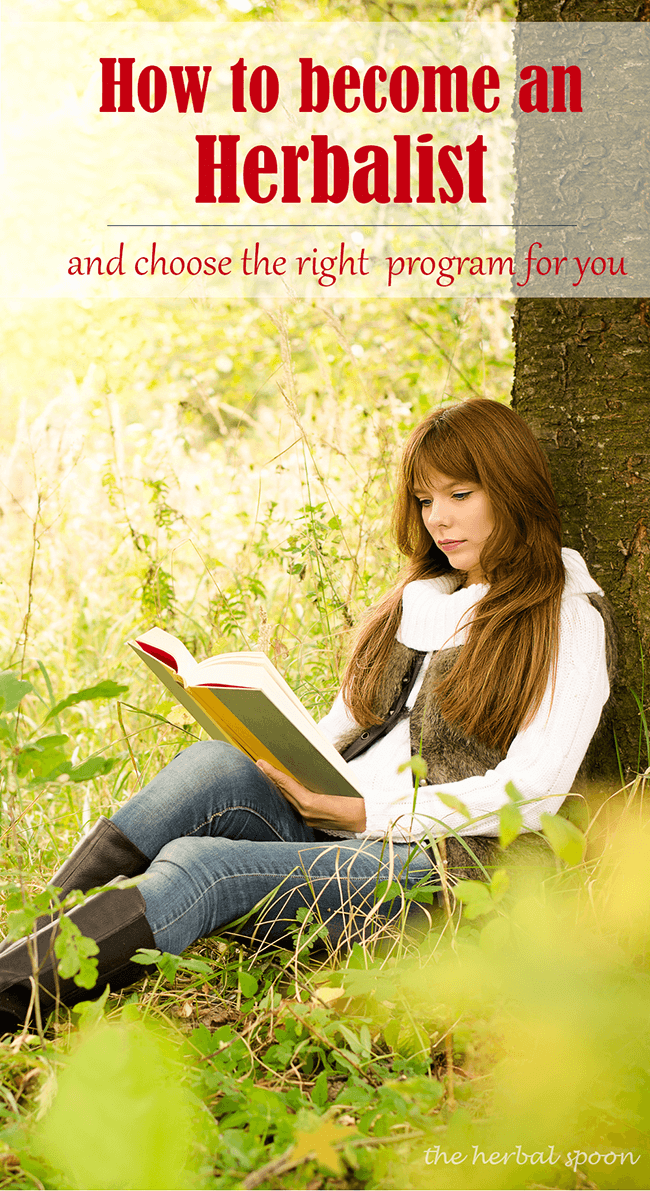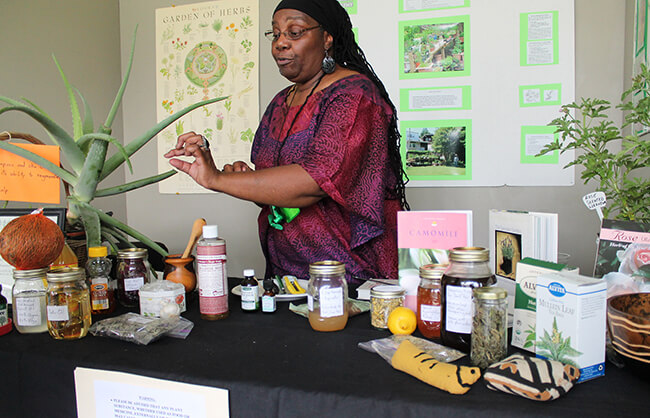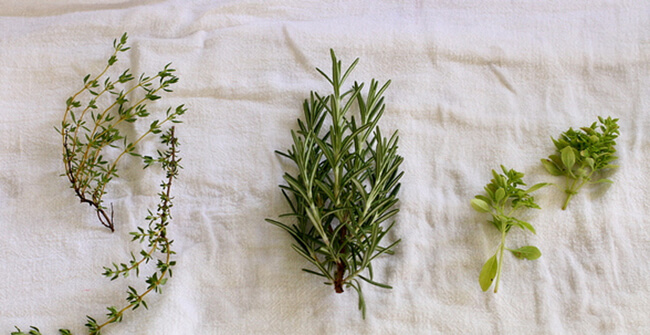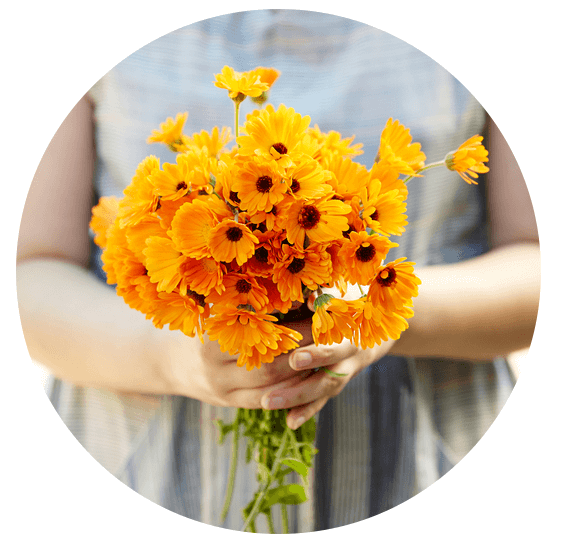
There are several paths that can help you become an herbalist, and there’s a lot of confusion about what an herbalist really is. Can you call yourself an herbalist if you follow natural remedy blogs, or do you have to have a master’s degree from an accredited college? Let me clear up some of the confusion and help you figure out the path you need to take to become an herbalist.
How to Become an Herbalist
I’m wary of programs that award a certificate dubbing someone a “master herbalist” after completing a short online course. Herbalism is a way of life. It’s not a destination, but a journey. There are many different paths people take to become an herbalist. Which way you go depends on your learning style and ultimate goals.
Read a lot of books
This option can be a great way to learn herbalism for those who love self-study. You can find a lot of health and herbalism books online and even some from your local library. It can be a great way to learn from herbal experts, but it also comes with some drawbacks. You may not have the space for 50 herbal books in your home, and you also have to be careful that you choose books that have accurate information.
Unless you have someone knowledgeable guiding you through the process, it can be difficult to make the right selections. I have about half a dozen herbal and natural remedy books sitting on my shelf right now that barely skim the surface and don’t have as detailed of info as I’d like. You can see some of the top herbal books that I do recommend for beginning herbalists in this post here.
Learn one on one from an experienced herbalist
A hundred years ago this is how everyone learned herbalism. The eclectic colleges trained doctors who used effective natural remedies on their patients before the development of synthetic drugs. You can search through the American Herbalist Guild here to find a registered herbalist or live course in your area. This method is a great way to learn from someone’s years of personal experience and continue the tradition of handing down herbal knowledge.
I live a few hours south of the renowned herbalist Jim McDonald, and I’ve always wanted to go on one of his herb walks. I still haven’t found the time though, and the cost for gas alone would be $50 for just one trip. While this is a great way to supplement an herbal education, time and money can be an issue. You also may not have an experienced herbalist in your nearby area, meaning lots of travel.
Take an Online Course
This is the option I chose because it fit best with my lifestyle and was affordable. I was able to have high quality information in one place so that I didn’t have to go digging trying to find it through Google. I don’t have to show up at 8 am for a class, I can do it at 9:30 at night after my son is in bed if I need to. I like being able to work at my own pace and supplement my self-study with a solid herbal course.
Psst … I talk more about herbalism courses below but in case you’re in a hurry, here are my favorites. They offer everything from beginner classes to advanced clinical herbalism. Check out the Herbal Academy of New England here.
Decide What you Need in a Herbalism Course
The first thing you need to ask yourself, is what is your goal in getting an herbal education?
- Do you want to be a registered herbalist and open up a clinic?
- Do you want to take control of the health of you and your family?
- Do you want to formulate products or health supplements and have a business?
- Do you want to learn a little , or are you looking for a comprehensive course?

Different Kinds of Herbalists
Clinical Herbalist
If you want to work with clients in an office setting, or create supplements to sell, then you need to take a comprehensive, in depth course. You’ll also want to learn hands on from an experienced herbalist. The American Herbalists guild has some great resources for this, and you can join the guild after you’ve met the training requirements. The Herbal Academy has a clinical herbalist track, and the East West School of Planetary Herbology’s clincial herbalist program is also highly recommended by many fellow herbalists.
Herbal Business Owner (Formulate Products and Supplements)
There’s no use in knowing how to formulate products if you can’t attract customers. The Herbal Academy of New England offers an Entrepreneur Herbalist course for those interested in starting an herbal business. This course will teach you how to master creating products and the technical side of how to run an herbal business.
Family Herbalist
This gives you the confidence to take care of your family. You can read a bunch of books and do self-study, however it can be difficult to make sure you can find all of the info you need for a well rounded approach. A program may be easier in this case. I like the Family Herbalist Path course from the Herbal Academy because it breaks everything down in an easy to understand format, but it’s thorough for the confidence you need to naturally care for your family.
The Dabblist
If you want to supplement a bit and not commit to a full herbal program, then you can read tons of books, and maybe add in some short courses. Short natural health courses don’t take up much time, but they can pack targeted information in one place. The intermediate courses I took from Vintage Remedies are discontinued, but The Herbal Academy of New England offers a seasonal variety of short courses.
Not all Herb Programs are Created Equal
I’ve unfortunately experienced bad herbal courses before. The first school I chose charged an arm and a leg, and had zero one on one instruction. Basically it had me buy a bunch of books on Amazon (so even more money) and then take a quiz to pass the “class.” I use that term class very loosely here as they didn’t actually teach anything!
After starting the program, I immediately regretted my decision. It cost at least twice as much as other courses, and there were multiple red flags that I should have seen beforehand.

What to Look for When Choosing an Herb Course
- Good reviews from real students and other professionals in the field
- They actually teach and aren’t just a certificate mill
- Offers a variety of learning content for different learning styles (videos, reading, audio)
- A program that doesn’t expire after a certain time. You don’t want to pay a lot for info, then life gets busy and you feel like it was a waste when your program access disappears one day.
- Instructors who are qualified in the area they’re teaching in and really know what they’re talking about. (big red flag if there aren’t any instructors!)
- A program where there’s support and a live person on the other end if you have questions.

Which Herbal Course is Right for You?
There are so many programs out there. Not every program is right for everyone, so decide on your goals and see if maybe the Herbal Academy can help you meet them.
- If you need distance learning because of a busy schedule, lack of access in your area, or a crazy family life.
- If you want a program that blends traditional herbalism that’s been passed down for thousands of years with current scientific research for accuracy, safety and effectiveness.
- If you want something that’s convenient and flexible, but where you also get one on one support from qualified instructors.
- If you need shorter, yet high quality audio and video files to fit the pertinent info that sticks with you into your busy life.
- If you want confidence to know that you’re choosing what’s safe and effective for yourself and family. The last thing you want to do is throw money away on herbal remedies that don’t work, or use ineffective dosing. You can read more about why herbal remedies don’t work here.
Why I Love the Herbal Academy
I first discovered the Herbal Academy of New England years ago, but I wasn’t sure how I felt at first. It takes a lot to convince me, and I wanted to be sure the courses were high quality. I fell in love with the blend of time tested traditional herbalism and the latest scientific research. Both are important to me.
- The instructors at the Herbal Academy know what they’re talking about and include renowned herbalists like Mathew Wood. Every time I’ve had a question they’ve been prompt with a knowledgeable response.
- Students have access to a private Facebook group to chat with other students and staff about herbal questions.
- There’s a variety of instruction with videos, text, herbal monographs, dozens of time-tested recipes, charts and handouts.
- The units are divided by body system, so you have a thorough understanding of how herbs affect the whole body.
- Many herbal programs are divided into Western herbalism and Eastern herbalism. The Herbal Academy combines the principles of energetics with traditional Western herbalism for a holistic perspective.
- It’s affordable, and they offer payment plans.

Is it Right for You?
You can check out all of the courses and herbal paths at the Herbal Academy here. There are beginner through advanced courses for a complete herbal education, no matter where you’re at or what your goal. They also have short courses, like botany and wildcrafting.

wow, great information! I have read so many books on herbs and foraging for them, it’s truly an amazing skill to learn and I learn more and more everyday from them! I have even been encourage to start an herbal garden & it was the best thing I ever did!! 🙂 I have been looking for online classes, but there are just so many to choose from. I will def keep this one in mind!
I love that you love herbs as much as I do! Like you I’ve done tons of self-study, 12 years worth in fact. I found that a course helped answer a lot of questions I had and fill in the gaps. Also I finally learned how to dose for maximum safety and effectiveness after I finally caved and did one of the VR courses. I kept thinking that it would be a waste of time since I already knew a lot, but boy was I wrong. Hopefully you’re able to weed through everything and find a course or two that meets your goals!
Wow 12 years is awesome! I am more at around 5-6 years. I decided to go with Herbal Academy of NE and have been pretty happy with them so far. Their love and respect mother nature matches mine. 🙂 I will most likely continue taking classes for the rest of my life because you can never learn everything in one class lol.
I like HANE a lot as well and plan on taking their clinical herbalist program! Eventually I’d like to get my aromatherapy certification from the Franklin Institute (founded by the people at Vintage Remedies) too. There’s just so much to learn that you’re right, you could keep taking them your whole life! Life long learning is such a gift and I’m glad we share that 🙂 My Aunt actually kept taking college courses throughout her adult life, eventually becoming a professor at the college and learning through teaching. I feel like I’m in it for the long haul too lol
Thanks for sharing. I pinned this so I can come back and figure out which option would be best for me.
Knowledge is power! I have been exploring herbs for years but not in a formal way so this program is interesting. We’re so glad you shared these valuable and enlightening insights with us. Thanks for sharing How to become an Herbalist at the Healthy, Happy, Green and Natural Party Blog Hop. I’m Pinning and sharing!
Knowledge is power! I have been exploring herbs for years but not in a formal way so this program is interesting. We’re so glad you shared these valuable and enlightening insights with us. Thanks for sharing How to become an Herbalist at the Healthy, Happy, Green and Natural Party Blog Hop. I’m Pinning and sharing!
What a fascinating post! Thank you for sharing at Tuesdays with a Twist! -Marci @ Stone Cottage Adventures
Such a great article. Can you tell me (ballpark) how much the course costs? I went to the page linked but there was no info on that and I’m trying to decide what course to take next and price is definitely a factor. Thanks in advance!!
Hi Ashley, the Family Herbalist course is only open for enrollment at certain times during the year, so the instructors can really devote quality attention to the students. Registration is currently closed, but you can sign up to be notified by email when its available again. I believe the cost of the basic course is between $600-1,200 and then the deluxe version with the extra downloads, video downloads and formulas is an additional $200. I’ve asked the VR staff what the price is since I can’t remember off of the top of my head, so I’ll reply back with that once I hear from them!
In the meantime, they have some really awesome intermediate courses that you can take right now. If you just go to the main page here, and click under the tab “online classes” you’ll see them. These are $200-300 depending on if you get all the extra downloads and formulas. https://vintageremedies.com/?ref=95 Or if you want a full blown college degree, then their sister school The Franklin Institute has that. https://franklininstituteofwellness.com/
Thanks for sharing all of this great information!